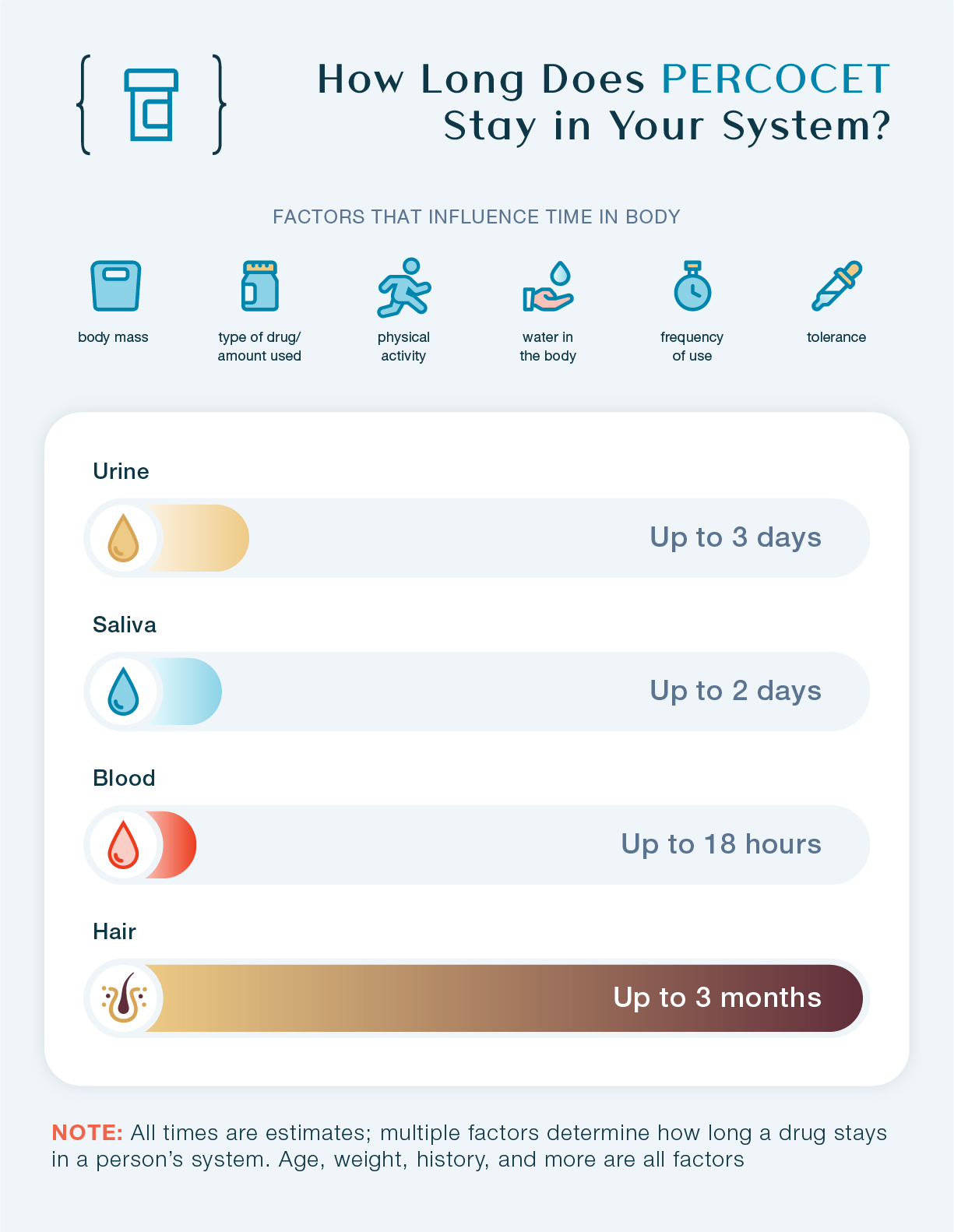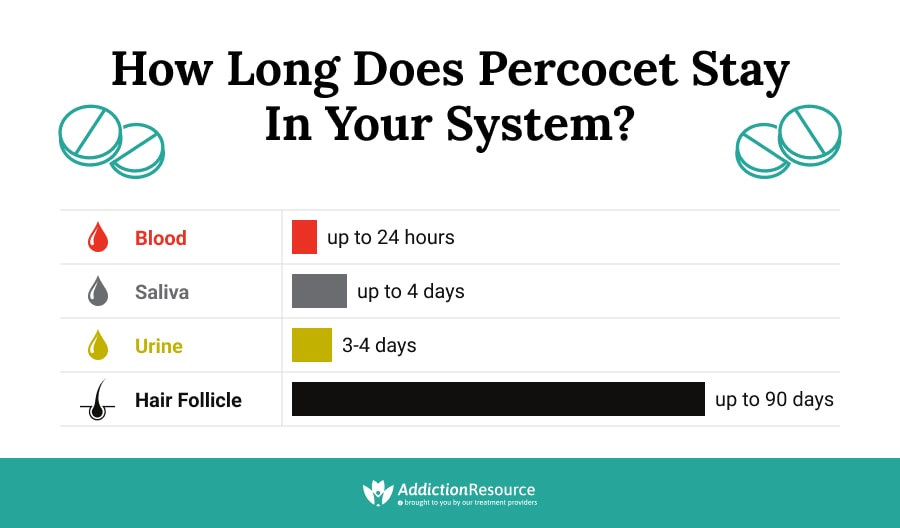Percocet can be detected in your system for up to 3 days. It is a prescription pain medication that contains oxycodone and acetaminophen.
When taken, Percocet is metabolized by the body and can be detected in urine, blood, saliva, and hair follicles. The detection window can vary based on factors such as frequency of use, metabolism, and hydration levels. Understanding how long Percocet stays in the system is important for individuals undergoing drug testing or considering medication interactions.
In this blog, we will explore the factors that influence the duration of Percocet in the body, discuss the different types of drug tests that can detect it, and offer tips for managing its presence in the system.

Credit: www.theedgetreatment.com
Introduction To Percocet
Percocet typically stays in your system for around 3-4 days after the last dose. Factors like metabolism and frequency of use can affect the duration. It’s important to consult a healthcare provider for personalized information on Percocet metabolism rates.
Percocet’s Purpose
Percocet is a prescription pain medication used for managing moderate to severe pain.
Active Ingredients
Percocet contains two main ingredients: oxycodone and acetaminophen.
Percocet’s Half-life
Percocet’s half-life is around 3-4 hours, but it can stay in your system for approximately 19 hours. Factors like metabolism and dosage can affect how long Percocet remains detectable in the body. It’s essential to consult a healthcare provider for personalized information.
Introduction: Percocet’s Half-life
Percocet, a combination of oxycodone and acetaminophen, is a powerful painkiller used to treat moderate to severe pain. If you’re wondering how long Percocet stays in your system, it’s important to understand the concept of half-life. The half-life of a drug refers to the time it takes for half of the drug to be eliminated from the body. In the case of Percocet, its half-life is influenced by various factors that affect drug retention in the body.
Factors Influencing Drug Retention
Several factors can influence how long Percocet stays in your system. These include:
- Age
- Metabolic rate
- Body mass
- Liver and kidney function
- Dosage and frequency of use
- Route of administration
For instance, younger people tend to have a faster metabolic rate, which means that the drug is eliminated from their system more quickly. On the other hand, people with impaired liver or kidney function may take longer to clear the drug from their system.
Average Duration In The System
How Long Does Percocet Stay in Your System? On average, it takes around 3-4 days for Percocet to be eliminated from the body. However, this can vary depending on the individual and other factors such as the dosage and frequency of use. The drug may be detectable in urine for up to 3-4 days, in blood for up to 24 hours, and in hair for up to 90 days. It’s important to note that even after the drug is eliminated from the body, its effects may still be felt. This is because of the drug’s impact on the brain and nervous system, which can last for several weeks or even months after stopping use.
In conclusion, understanding the half-life of Percocet is crucial in determining how long it stays in your system. Factors such as age, metabolic rate, and dosage can influence how long the drug stays in your body. It’s important to follow your doctor’s instructions when taking Percocet and to avoid misusing or abusing the drug.
Detection Timelines
If you have taken Percocet, it is essential to know how long it stays in your system. The detection timeline of Percocet varies depending on the type of test used to detect it. The most commonly used tests to detect Percocet are urine, blood, saliva, and hair follicle tests. Each test has its detection timeline, which is crucial to understand if you want to pass a drug test.
Urine Tests
Urine tests are the most commonly used tests to detect Percocet. The detection timeline of Percocet in urine tests is as follows:
- Percocet can be detected in urine tests for up to 3-4 days after the last dose.
- In chronic users, Percocet can be detected in urine tests for up to a week or more after the last dose.
- The detection timeline of Percocet in urine tests may vary depending on the dose, frequency of use, and individual metabolism.
Blood Tests
Blood tests are less common but can be used to detect Percocet in your system. The detection timeline of Percocet in blood tests is as follows:
- Percocet can be detected in blood tests for up to 24 hours after the last dose.
- Chronic users may have detectable levels of Percocet in their blood for up to three days after the last dose.
Saliva Tests
Saliva tests are also less common but can be used to detect Percocet in your system. The detection timeline of Percocet in saliva tests is as follows:
- Percocet can be detected in saliva tests for up to 1-4 days after the last dose.
- In chronic users, Percocet can be detected in saliva tests for up to a week or more after the last dose.
Hair Follicle Tests
Hair follicle tests are the most sensitive tests and can detect Percocet in your system for a more extended period. The detection timeline of Percocet in hair follicle tests is as follows:
- Percocet can be detected in hair follicle tests for up to 90 days after the last dose.
- The detection timeline of Percocet in hair follicle tests may vary depending on the dose, frequency of use, and individual metabolism.
It is essential to know the detection timeline of Percocet in different tests to avoid failing a drug test. If you have taken Percocet and have to undergo a drug test, make sure to consult with a medical professional to understand the best course of action.
Effects On The Body And Mind
Percocet can stay in the body for about 3-4 days. It affects the body and mind by providing pain relief and a sense of euphoria, but it can also lead to drowsiness and impaired cognitive function. Understanding its duration in the system is important for safe usage and avoiding potential side effects.
Short-term Impact
Percocet, a powerful prescription pain medication, can have immediate effects on both the body and mind. When taken, it quickly begins to relieve pain and induce a sense of relaxation. The short-term impact of Percocet can include:
- Alleviation of pain and discomfort
- Feelings of relaxation and euphoria
- Reduced anxiety and stress
- Drowsiness and sedation
- Suppressed cough reflex
These short-term effects can provide much-needed relief for individuals dealing with acute pain or recovering from surgery. However, it’s important to note that Percocet can also have potentially dangerous side effects, especially when misused or taken in excessive doses.
Long-term Risks
While Percocet can be highly effective in managing pain, long-term use or abuse of the medication can lead to various risks and complications. Extended use of Percocet can result in:
- Tolerance: Over time, the body may develop a tolerance to the effects of Percocet, requiring higher doses to achieve the same pain relief.
- Physical dependence: Prolonged use of Percocet can lead to physical dependence, where the body relies on the drug to function normally. Abruptly stopping or reducing the dosage can result in withdrawal symptoms.
- Addiction: Percocet contains oxycodone, an opioid that can be highly addictive. Continued misuse or abuse of the medication can lead to addiction, characterized by a compulsive need to use the drug despite negative consequences.
- Organ damage: Long-term use of Percocet can put a strain on various organs, particularly the liver. This can lead to liver damage or even failure.
- Respiratory problems: High doses of Percocet can depress the respiratory system, leading to breathing difficulties or even respiratory failure.
It’s crucial to use Percocet strictly as prescribed by a healthcare professional and to be aware of the potential risks associated with long-term use or misuse. Regular monitoring and open communication with a healthcare provider are essential to ensure the safe and effective use of this medication.
Withdrawal Symptoms
Withdrawal symptoms from Percocet can vary in duration, but the drug typically stays in your system for about 3-4 days. These symptoms may include nausea, anxiety, muscle aches, and insomnia. It’s important to consult a healthcare professional for guidance on managing withdrawal and finding appropriate treatment options.
Early Stage Symptoms
During the early stages of Percocet withdrawal, individuals may experience a range of physical and psychological symptoms. These symptoms typically begin within a few hours after the last dose and can last for several days. It’s important to note that the severity and duration of these symptoms may vary from person to person.
Here are some common early stage symptoms of Percocet withdrawal:
- Restlessness and irritability
- Anxiety and panic attacks
- Insomnia and disturbed sleep patterns
- Muscle aches and pains
- Excessive sweating
- Nausea and vomiting
- Increased heart rate
- Runny nose and watery eyes
Extended Withdrawal Effects
While the early stage symptoms of Percocet withdrawal tend to subside within a few days, some individuals may experience extended withdrawal effects that can last for weeks or even months. These effects may be more psychological in nature and can be challenging to overcome.
Here are some extended withdrawal effects that individuals may experience:
- Depression and mood swings
- Intense drug cravings
- Fatigue and lethargy
- Difficulty concentrating and poor memory
- Loss of appetite and weight loss
- Increased sensitivity to pain
- Social isolation and withdrawal from activities
- Emotional instability and irritability
It’s important to seek professional help and support when dealing with Percocet withdrawal symptoms. A healthcare provider can provide guidance and offer appropriate treatment options to manage these symptoms effectively.

Credit: www.theedgetreatment.com
Quick Detox Tips
When it comes to detoxing your body from Percocet, incorporating quick and effective methods is essential. These quick detox tips can help accelerate the elimination of Percocet from your system, allowing for a smoother transition towards sobriety. By focusing on hydration and nutrition, exercise and saunas, and medical detoxification, you can enhance your body’s natural detoxification processes.
Hydration And Nutrition
Staying well-hydrated and maintaining a balanced diet can facilitate the detoxification process. Drinking plenty of water helps flush out toxins, while consuming nutrient-rich foods supports overall health and recovery. Incorporating fruits, vegetables, and lean proteins can aid in replenishing essential nutrients while eliminating toxins from your system.
Exercise And Saunas
Engaging in regular physical activity, such as brisk walking or yoga, can promote sweating, which aids in expelling toxins from the body. Additionally, spending time in a sauna can further enhance the detox process by promoting perspiration. Both exercise and sauna sessions can support the elimination of Percocet from your system, contributing to a faster detoxification.
Medical Detoxification
Seeking professional medical detoxification assistance can provide a safe and effective way to cleanse your body of Percocet. Under the guidance of healthcare professionals, you can undergo a supervised detox process that may include medication-assisted treatment to manage withdrawal symptoms and support your body’s detoxification. Medical detoxification offers a structured and supportive environment for individuals seeking to rid their bodies of Percocet.
Aftercare And Support
Percocet, a prescription pain medication, can stay in your system for approximately 3-4 days. During this time, it is important to have proper aftercare and support to manage any potential withdrawal symptoms or cravings. Seek medical guidance and support to ensure a safe and successful recovery process.
Counseling And Therapy
Individuals can benefit from counseling sessions to address underlying issues.
Therapy helps develop coping mechanisms for a drug-free life.
Support Groups
Support groups provide a sense of community and understanding.
Members share experiences and offer encouragement for recovery.
Relapse Prevention Strategies
Learning strategies to identify triggers and avoid relapse situations.
Developing a plan with coping skills for challenging moments.

Credit: addictionresource.com
Legal And Safety Considerations
It is important to consider legal and safety implications when discussing how long Percocet stays in the system. The drug’s effects can impair driving and other activities, and it is a controlled substance that requires a prescription. It is also illegal to use Percocet without a prescription or to sell or distribute it.
Prescription Regulations
In the U.S., Percocet is a prescription drug, strictly regulated by law.
Risks Of Illicit Use
Using Percocet without a prescription can lead to addiction and legal consequences.
Frequently Asked Questions
How Long Does Percocet Stay In Your System?
Percocet can stay in your system for approximately 3 to 4 days. However, the exact duration can vary depending on factors such as metabolism, dosage, frequency of use, and individual differences. It is important to note that drug detection times can also differ between urine, blood, and hair tests.
It is advisable to consult a healthcare professional for personalized information regarding Percocet’s presence in your system.
What Affects The Duration Of Percocet In Your System?
Several factors can influence how long Percocet remains detectable in your body. These include your metabolism, age, weight, liver function, and the dosage and frequency of Percocet use. Additionally, the type of drug test being conducted, such as urine, blood, or hair test, can also impact detection times.
It is crucial to understand that individual variations may occur, and consulting a healthcare professional is recommended for accurate information.
How Does Metabolism Affect Percocet Elimination?
Metabolism plays a significant role in the elimination of Percocet from your system. Individuals with a faster metabolism tend to process drugs more quickly, resulting in shorter detection times. Conversely, those with a slower metabolism may take longer to eliminate Percocet.
Factors such as age, genetics, and overall health can influence the speed of metabolism. It is advisable to discuss your specific circumstances with a healthcare professional for personalized information.
Conclusion
Understanding how long Percocet stays in your system is crucial for safe usage. By knowing the detection times and factors that influence clearance, you can make informed decisions. Always consult a healthcare professional for personalized advice and ensure responsible use of this medication.
Stay informed, stay safe.